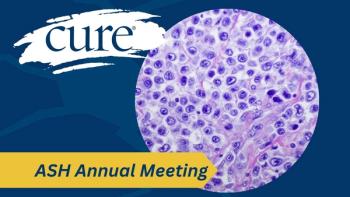
Among older patients with newly diagnosed diffuse large B-cell lymphoma (DLBCL), Epkinly plus R-mini-CHOP appeared to be well tolerated and elicited responses.

Kristie L. Kahl is vice president of content at MJH Life Sciences, overseeing CURE®, CancerNetwork®, the journal ONCOLOGY, Targeted Oncology, and Urology Times®. She has been with the company since November 2017.
She is a graduate of Rider University, where she acquired a Bachelors of Art in journalism, as well as a graduate of Temple University, where she received her Masters of Science in Sports Management.
Follow Kristie on Twitter at @KristieLKahl, or email her at [email protected].

Among older patients with newly diagnosed diffuse large B-cell lymphoma (DLBCL), Epkinly plus R-mini-CHOP appeared to be well tolerated and elicited responses.

Transitioning treatment with Niktimvo to a dose of 0.6 mg/kg every four weeks appeared feasible for chronic graft-versus-host disease.

Trodelvy plus Keytruda may maintain quality of life and slow physical decline in metastatic triple-negative breast cancer.

Trodelvy reduced risk of disease progression or death versus chemotherapy in patients with previously untreated metastatic triple-negative breast cancer.

Dr. Alicia Arnold and Dr. Priyanka Raval discuss first- and later-line treatment options for those with ER-positive, HER2-negative stage 4 breast cancer.

Dr. Mabel Mardones educates patients on breast cancer subtypes, as well as treatment options for those with ER-positive, HER2-negative disease.

Dr. Alicia Morgans discussed complications associated with ADT in prostate cancer, and how men can still maintain quality of life regardless.

Dr. Kristen Scarpato explains the role of genetic testing in prostate cancer care, as well as its use in determining treatment with PARP inhibitors.

Dr. Kelly Stratton answered the most frequently asked questions in prostate cancer regarding localized prostate cancer care, including surgery and focal therapy.

Dr. Kelly Stratton answers the most frequently asked questions in prostate cancer regarding risk for recurrence, progression and treatment options.

Tara Sweeney, BSN, RN, OCN, CHPN discussed best care for the health and well-being of a person across all stages of their cancer survivorship.

Aspirin use in patients with PI3K-mutated colorectal cancer helped to reduce disease recurrence, highlighting the importance of upfront genomic testing.

Patients newly diagnosed with multiple myeloma who are transplant ineligible or deferred may benefit from receiving a Darzalex treatment combination.
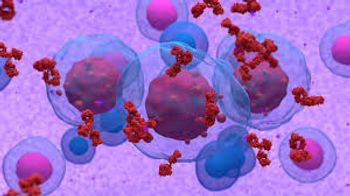
The risk for disease progression or death was reduced by 51% with subcutaneous Darzalex Faspro in certain patients with smoldering multiple myeloma.

Calquence plus Venclexta, with or without Gazyva, improved progression-free survival over the standard-of-care chemoimmunotherapy in patients with untreated chronic lymphocytic leukemia.

Long-term follow-data shows Revuforj to be effective in the treatment patients with R/R KMT2Ar acute leukemias.

For patients with transplant-ineligible or -deferred newly diagnosed multiple myeloma, the addition of Darzalex to VRd improved MRD responses as well as progression-free survival.

Following a CURE® Educated Patient® Lung Cancer Summit, the City of Hope expert answered 10 commonly asked questions from patients with lung cancer.

When compared with Zytiga, Xtandi appeared to have a lower incidence of infection among men with prostate cancer, especially those under 70 years.

Among patients with EGFR-mutated, advanced NSCLC, frontline treatment with Rybrevant plus Leclaza significantly prolonged progression-free survival.

Dato-DXd was efficacious in patients with non-small cell lung cancer with brain metastases who have certain gene alterations, a phase 2 study showed.

Patients with high-risk prostate cancer who had a higher dose of radiation plus long-term androgen deprivation therapy tended to live longer than those who had a lower dose.
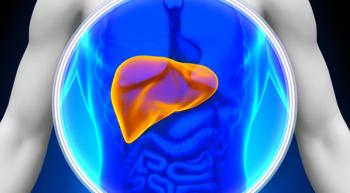
Keytrida plus Lenvima improved survival and duration of response in patients with advanced hepatocellular carcinoma.

A nurse practitioner talks about personalized therapy and the role that genomic testing plays for patients with breast cancer.

Study findings support the use of a financial navigation program, in hopes of aiding patients with multiple myeloma affected by financial toxicity.

Brukinsa led to improved progression-free survival over Imbruvica in patients with relapsed or refractory chronic lymphocytic leukemia or small lymphocytic lymphoma, follow-up from the phase 3 ALPINE study showed.

Research demonstrated comparable outcomes in the real-world setting and in the phase 2 MajesTEC-1 trial when it came to treatment with Tecvayli for relapsed or refractory myeloma.

A phase 3 trial demonstrated progression-free survival improvements with Tecentriq-chemotherapy combination in patients with endometrial carcinoma.

Researchers continue to investigate novel immunotherapy drugs for the treatment of renal cell carcinoma.
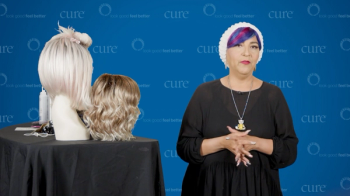
In this on-demand webinar series, CURE partnered with Look Good Feel Better to offer fun wig options for patients to wear after hair loss from cancer treatment.

Published: April 1st 2022 | Updated:

Published: December 31st 2020 | Updated:

Published: May 21st 2022 | Updated:

Published: March 2nd 2023 | Updated:
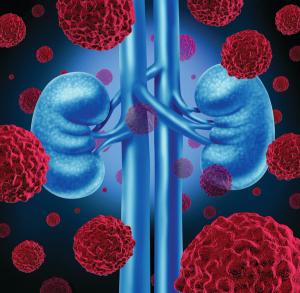
Published: June 6th 2021 | Updated:

Published: October 1st 2023 | Updated: